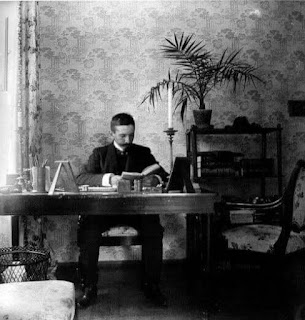Sources:
Treize années à la cour de Russie: Le tragique destin de Nicolas II et de sa famille, pages 149 to 150, by Pierre Gilliard, 1921
Thirteen Years at the Russian Court, pages 177 to 178, by Pierre Gilliard, translated by F. Appelby Holt, 1921
The account:
L'atmosphère politique était de plus en plus accablante et l'on sentait l'orage approcher. Le mécontentement était devenu si général, que, malgré la censure, il commençait à se manifester dans la presse. Les dissensions se faisaient toujours plus profondes. Il n'y avait qu'un point sur lequel tout le monde était d'accord, c'était la nécessité de mettre fin à l'omnipotence de Raspoutine. Tous voyaient en lui le conseiller néfaste de la cour et le rendaient responsable des maux dont souffrait la pays. On l'accusait de tous les vices et de toutes les débauches, on en faisait un être immonde et répugnant aux allures fantastiques, capable de toutes les bassesses et de toutes les ignominies. Pour beaucoup, il était une émanation de Satan, l'Antéchrist dont la venue redoutée devait être le signal des pires calamités.
L'empereur avait résisté longtemps à l'influence de Raspoutine. Au début, il l'avait toléré n'osant porter atteinte à la foi que l'impératrice avait mise en lui et où elle puisait l'espérance qui la faisait vivre. Il avait craint de l'éloigner, car si Alexis Nicolaïévitch avait succombé, il eût été sans doute aux yeux de la mère le meurtrier de son enfant. Mais il avait gardé une prudente réserve et il ne fut gagné que peu à peu aux idées de l'impératrice. On avait, à maintes reprises, essayé de le renseigner sur la véritable personnalité de Raspoutine et de provoquer l'éloignement du staretz. Souvent ébranlé, le tsar n'avait jamais été convaincu.
English translation (by Holt):
The political atmosphere became more and more heavy, and we could feel the approach of the storm. Discontent had become so general that in spite of the censorship the Press began to speak about it. Party feeling ran ever higher, and there was only one point on which opinion was unanimous — the necessity of putting an end to the omnipotence of Rasputin. Everyone regarded him as the evil counsellor of the Court and held him responsible for all the disasters from which the country was suffering. He was accused of every form of vice and debauchery and denounced as a vile and loathsome creature of fantastic habits, and capable of baseness and ignominy of every kind. To many he was an emanation of the devil himself, the anti-Christ whose dreaded coming was to be the signal for the worst calamities.
The Czar had resisted the influence of Rasputin for a long time. At the beginning he had tolerated him because he dare[d] not weaken the Czarina's faith in him — a faith which kept her alive. He did not like to send him away, for if Alexis Nicolaïevitch had died, in the eyes of the mother he would have been the murderer of his own son. Yet he had maintained a cautious reserve, and had only gradually been won over to the views of his wife. Many attempts had been made to enlighten him as to the true character of Rasputin and secure his dismissal. His confidence had been shaken, but the Czar had never yet been convinced.
Above: Nicholas and Alexandra with Alexei.
Above: Grigori Rasputin.
Above: Pierre Gilliard.



No comments:
Post a Comment